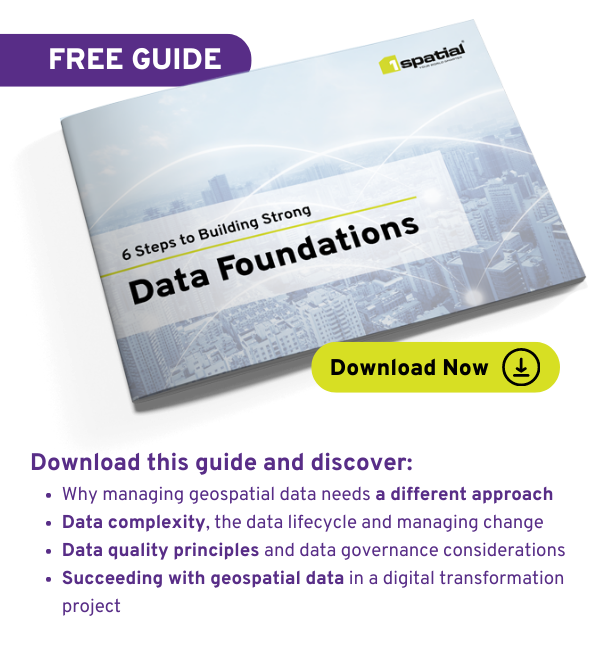Data Foundations
Gain - and maintain - confidence in your data
A robust data foundation enables critical decision-making, improves efficiencies, reduces project risk and decreases ongoing data maintenance costs. It also enables an organisation to respond readily to emerging regulations and standards.
1Spatial has been at the forefront of data quality and governance for the past 30 years. We've helped more than 1,000 customers develop strong data foundations, unlocking the value of their data and enabling them to make critical decisions.
What is a data foundation?
A data foundation is defined as data that is:
- fit for purpose,
- recorded in standardised formats (on modern, future-proof systems)
- and QFAIR – Quality, Findable, Accessible, Interoperable and Reusable
Are your data foundations strong enough?
- Can you trust your data for accurate predictions, modelling and analysis?
- Is your data findable, accessible, interoperable, accurate and complete?
- Does your data need to conform with key industry standards or regulations?
The benefits of robust data
There are far-reaching benefits to building strong data foundations, including improved data sharing and interoperability, greater efficiency, being able to make better use of existing data, and improved decision-making. Read more about the benefits of strong data foundations.
How 1Spatial can help
Whether you’re looking to embark on a digital transformation project, improve your data quality, or align your data with specific industry standards, we can help you unlock the value of your data, enabling you to improve the quality of your analytics, predictions and modelling.
Our capabilities
- Data assurance and quality - Our no-code rules engine 1Integrate can validate how well your data conforms to business-critical standards or requirements and provides reports to indicate where corrections are needed.
- Data cleansing - Our technology can automatically repair errors, inconsistencies and gaps in your data and create a process for continuous, automated improvement.
- Data enrichment and enhancement - We can help you make most of your data by combining the best of various datasets - even if the data exists in different forms and systems - keeping your data fit for purpose.
- Data governance and management - We can help you to dramatically reduce the cost and complexity of data management and governance by making data management a consistent, repeatable process.

Fill out this form to get a copy of our guide (via email):
Ordnance Survey Northern Ireland
See how we’ve helped Ordnance Survey Northern Ireland create a more joined up system of land and property data. By embedding unique spatial identifiers into Northern Ireland’s land use and built environment, we helped them create an integrated geospatial information framework, improving user confidence in data accuracy and quality, as well as in the ongoing capturing and management of data.
About 1Spatial
Operating at the intersection of Master Data Management and Geospatial Information Systems, 1Spatial are pioneers in Location Master Data Management (LMDM).
Location Master Data Management ensures that your data management process is automated and repeatable across your enterprise and different technology platforms.
Using our powerful rules-based technology, we automate the data validation, auditing, cleansing, synchronising and governance of spatial and non-spatial datasets across the entire data ecosystem, enabling better decisions and greater insights.
LMDM delivers significant cost and time savings, and crucially, data that you can trust and rely upon – enabling you to maintain the quality and integrity of your data as it continues to evolve.
It also prepares your data for system replacement and consolidation if needed. Unlike traditional MDM, LMDM provides you with the right location-enabled technology to meet your unique needs for spatial and non-spatial data.
About our rules-based approach
1Spatial’s pioneering rules-based approach uses automation to give you power over your data, putting you in control so that you can be confident it is current, complete, consistent and compliant.
A rules-based approach ensures that processes are:
- easily automated
- repeatable across the enterprise and
- repeatable across different technology platforms.
Our technology is designed to manage complex, multivariable rules on data, irrespective of size. The rules engine that sits at the heart of our technology was developed by drawing on over 30 years’ experience in the management of geospatial data.
Find out why 1Spatial’s technology powers some of the largest and most complex data sets in the world.
What sets us apart from traditional GIS providers
Although geospatial data can be handled by traditional GIS software or some database tools, there are key exceptions – which is where 1Spatial’s technology sets us apart, and critically, helping save customers time and money:
- No need for centralisation: Traditional software providers can typically only handle data that has already been centralised into one environment. 1Spatial tools can check and cross-reference the data from different sources and without needing them to be pre-loaded into a central system.
- No-code rules development - Other systems don't provide no-code rules development and often require queries or code to be written by specialist developers.
- Scale and complexity of data - Other systems can struggle with the performance of large amounts of complex cross-referencing needed between the data records.
- Cloud-based data upload portal - Other systems don’t provide an out-of-the box, secure, multi-tenancy data upload portal as a way to aggregate data and automatically apply rules.

